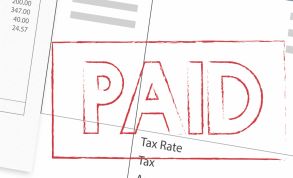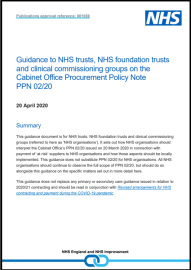Procurement guidance to support supplier cash flow
NHS England and NHS Improvement this week published guidance to support last month’s Cabinet Office procurement policy note (PPN 02/20), which aims to ensure suppliers at risk from the outbreak are able to resume normal contract delivery once the outbreak is over. The guidance aligns with the PPN in currently being applicable until 30 June.
It covers three areas aimed at supporting cash flow for suppliers.
First it underlines earlier calls for the NHS to speed up payment of suppliers, issued in the wake of a new temporary finance regime announced in March. All organisations should aim to pay all invoices within seven days of receipt of goods and service. Currently public sector bodies are expected to pay suppliers within 30 days.
If there are disputed elements on invoices, payments should be made for the undisputed elements and all invoice queries should be resolved within a further seven days. The national bodies believe that the move to block contracts, with two months cash delivered during April, should ensure sufficient cash is available to implement these changes.
NHS Shared Business Services, which provides finance and accounting services to 74 NHS providers and arm’s length bodies and to all commissioning bodies, has taken steps to ensure the payment and approval process does not create obstacles to cash flow.
The guidance also sets out the extent of flexibilities for NHS bodies to prepay – making clear that prepayments will only be appropriate in ‘extremely limited and exceptional circumstances’ where the accounting officer is satisfied that there is a value for money case for making the payment. Where goods and services are expected to be supplied at contractual volumes, a prepayment of up to 25% of the contracted value can be paid, which may for example help to support an increase in supplier stock holding.
These will be local decisions and there will be no further cash support to support these cases.
It is the third area in the guidance that has provoked the most questions from suppliers and NHS bodies. This involves the ability to pay suppliers for goods or services where provision is reduced or paused temporarily as a result of Covid-19. It was initially intended to leave accountable officers in local organisations to make decisions about requests for these types of payments. However, it has now been decided that these decisions should involve the central bodies.
‘It is highly unlikely that local NHS organisations have sufficient visibility of the national market to ascertain the strategic importance of a supplier,’ the guidance says. And where payments are authorised by NHS England and NHS Improvement, the guidance says they will be nationally funded.
Any advance payments will be at cost and will be reconciled back to actual goods and services received. However the cost of goods and services not ultimately received will be recorded as losses and special payments.
Related content
We are excited to bring you a fun packed Eastern Branch Conference in 2025 over three days.
This event is for those that will benefit from an overview of costing in the NHS or those new to costing and will cover why we cost and the processes.